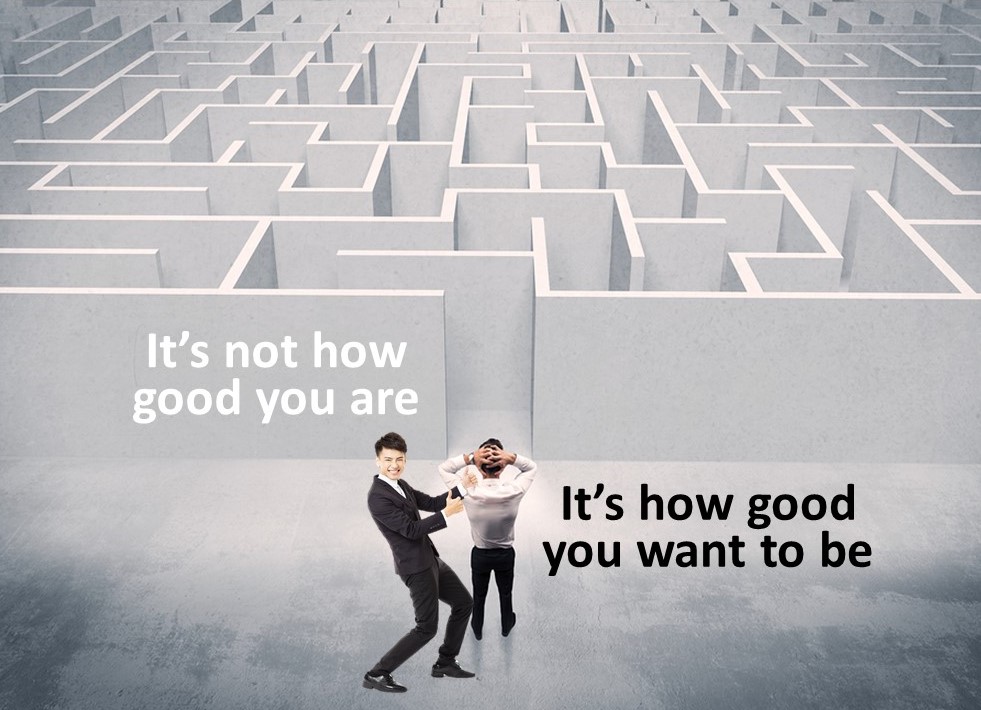So, let’s start with: What is a Growth Mindset?
Stanford psychologist Dr. Carol Dweck and author of “Mindset: The New Psychology of Success” explains how there are two types of mindsets: growth and fixed mindset.
Dr Carol Dweck describes how a growth mindset embraces challenges and views failure “not as evidence of unintelligence but as a heartening springboard for growth and for stretching our existing abilities.” While a fixed mindset grips onto the belief that intelligence and talents are static, and success is accomplished solely based on talent and little effort. Check out the summary of Growth Mindset and Fixed Mindset below
Growth Mindset vs Fixed Mindset
Growth Mindset
It’s where you want to be
- Embraces challenges
- Perseveres in spite of failure
- Believes that people can increase their intelligences of skills
- Is inspired and motivated by the success of others
- Wants to learn
- Accepts and embraces criticism
Fixed Mindset
It’s what you have
- Avoid challenges
- Gives in in the face of hardship
- Believes that intelligence and skills are what you are born with and can’t change or develop.
- Is threatened by the success of others
- Believes they know everything already
- Ignores or dismisses criticism
Growth Mindset and Fixed Mindset – a quick guide
The growth mindset definition is:
People with growth mindsets believe that skill and intelligence are something that people can develop. They believe that while people have inherent qualities and traits, success comes from constant personal development.
The fixed mindset definition is:
By contrast, those with fixed mindsets believe that talent and intelligence are something you either have or you don’t.
That is, some people are good at certain activities, and others excel in different areas. They don’t believe that practice, failure and strategy development are key to developing talent or intelligence.
What Dweck discusses is that those who do develop a high degree of talent are more often people with a growth mindset.
It works both ways.
An important finding of Dr Carol Dweck’s research is that those with growth mindsets experience greater success and skill development.
15 ways to develop a growth mindset

Now that you have an idea of what a growth mindset is (vs a fixed mindset), let’s dig a little deeper. We compiled 15 techniques to help you unlock the growth mindset part of your brain. Let’s get started!
- Determine where you sit now. Do you always make effort to improve, get feedback, or would you describe yourself as having a fixed mindset?
Knowing where you stand, is the first step. You can’t tell where to go if you don’t know where you are. - Cultivate your sense of purpose. Take time to reflect and find your purpose. What is it about the growth mindset that motivates you to change? What benefits do you see a growth mindset bringing to your life? Understanding this will give you purpose especially during the difficult stages of developing this worldview.
- Reflect. Most of us take time to reflect on successes – develop the new habit to also take time to acknowledge, reflect, and embrace all your failures, and what you have learnt. Becoming aware of your areas of improvement is the stepping stone in cultivating a growth mindset. Hiding from your weaknesses means you will never overcome them, inhibiting your success.
- View Challenges as Opportunities. To quote Elbert Hubbard, “The greatest mistake you can make in life is to be continually fearing you will make a mistake.” Part of developing a growth mindset is shattering the negative perception of a challenge. Embrace challenges and view them as fruitful learning experiences for self improvement, that you would not get otherwise.
- Stop Seeking approval. When you prioritise getting approval over learning, you sacrifice your own potential for growth.
- Cultivate grit. Grit gives that internal push to keep moving forward and fulfill your commitments.
- Change your perspective on failure. Start viewing failure not as a sign of inability, but as part of the process of learning. Even the world’s greatest athletes, leaders, artists, scientists all started out as new kids on the block with little talent or expertise.
- Seek constructive feedback. A growth mindset proactively seeks feedback from peers, friends, and leaders. It’s a chance to find lessons, learn from mistakes, and target efforts into skills that matter in the long run.
- Turn criticism around until you find its gift. The purpose of criticism is to make things better. Someone else can see what you are doing from a slightly different perspective than you and may have some valuable suggestions for you. If you open up to hearing suggestions, you can more easily develop your growth mindset
- Notice how you speak and act. Observe how you talk about talent and skill. Do you find yourself saying things like, “He’s just naturally talented”, “I’m born to be bad with this”?
- Use the word “yet” more often. This is a simple one. Whenever you catch yourself thinking “I’m not good at this,” add the word “yet”. For eg, “I’m not very good at this yet.” Incorporating the word “yet” into your vocabulary signals that despite any struggles, it is a matter of time and little effort before mastery.
- Jot down goals. Growth mindset people are aware that once one goal is down they have others lined up to pursue. Create clear, realistic goals based on your passion and purpose. And be sure to give yourself enough time to conquer them thoroughly.
- Be realistic. It takes time, sometimes a huge amount of time, to learn a new skill, or a new language or to how to become a good teacher. Keeping this in mind is useful in nurturing a growth mindset.
- Identify opportunities to celebrate the success of others. When others around you succeed, celebrate! In addition, get curious about what made them successful. And, even better, ask them. Engage others to get insights on how they approached the challenge, what efforts they undertook to get there. Yes, do this!
- Take ownership of your attitude. Only you can decide what attitude you hold. Fixed mindsets tend to harbor negative and pessimistic attitudes. Kick those thoughts out now. The power of positive, optimistic thinking can shift your mood instantly that not only inspires you but others around you as well. [Are you doubting this? Well, try it out now :)]
Perhaps the best way to sum up the essence of Growth Mindset vs Fixed Mindset is this: “It’s not how good you are, but how good you want to be.”

Recommended Readings on Growth Mindset vs Fixed Mindset
- Why Having A Growth Mindset Matters To You
- 15 Ways To Develop A Growth Mindset
- How To Maximise Your Personal Development with MBTI and Growth Mindset
- Learning Videos on Growth Mindset and Fixed Mindset
- Why Companies are recruiting employees with a growth mindset
- Why Growth Mindset Should be part of your personal brand
- How A Fixed Mindset Killed Kodak, The King of Film

Lunch and Learn – Growth Mindset Talks
If you would like to have a
Growth Mindset Lunchtime Talk (1 hr), Growth Mindset Talk (2 hrs), or a
Growth Mindset Workshop (half day or 1 day), or a
Growth Mindset Course (2 days),
please contact 36 HR Training and Consultancy, explaining what your expectations are, and WHY you would like to have the talk. We conduct all training, talks, workshops in both zoom or in physical classroom mode, but recommend zoom mode for now due to the pandemic.
